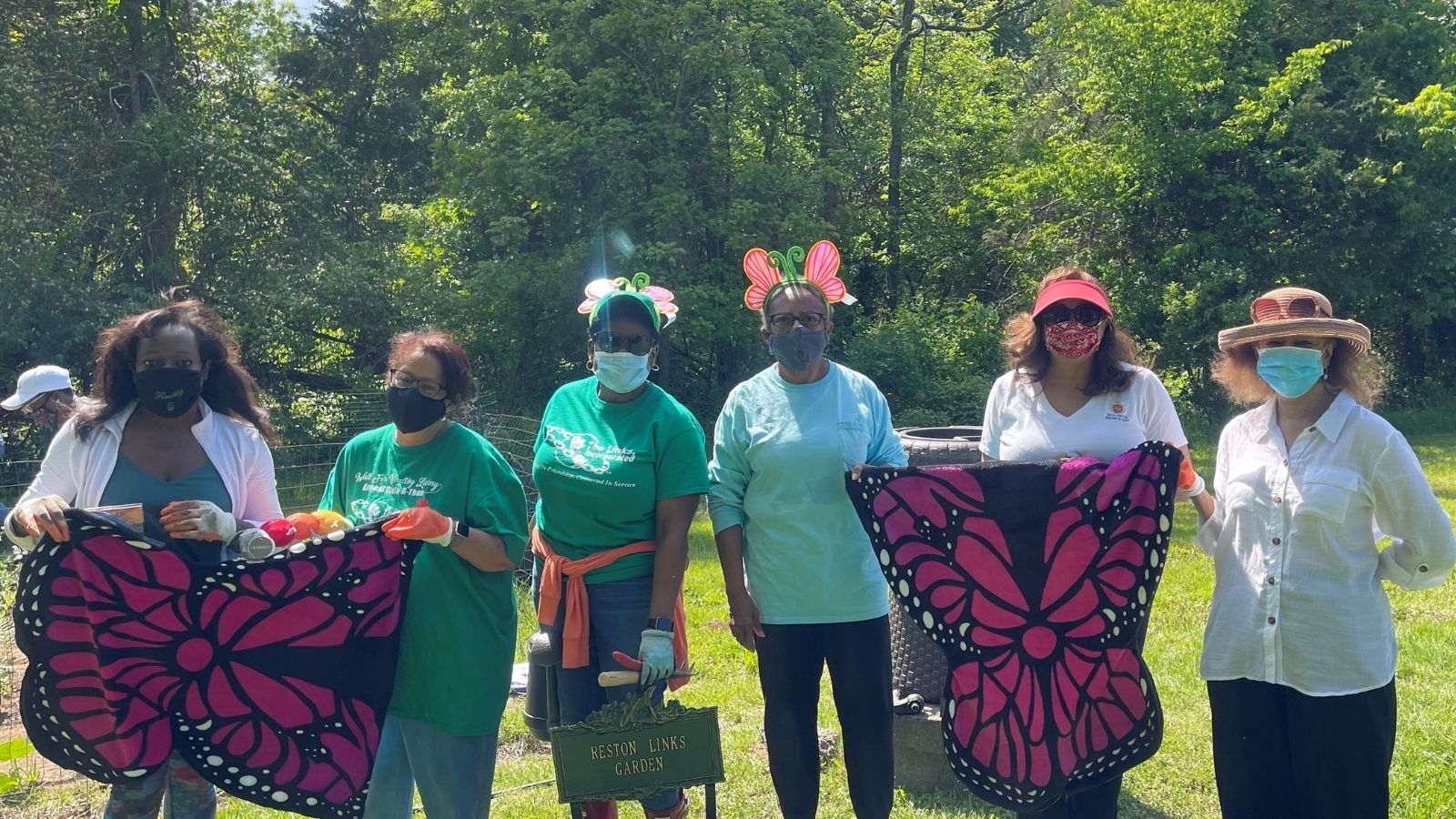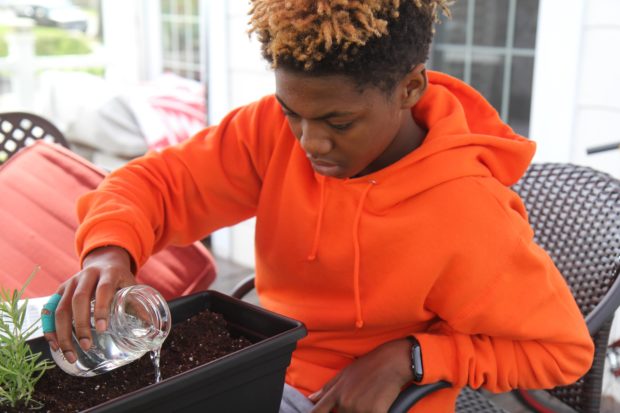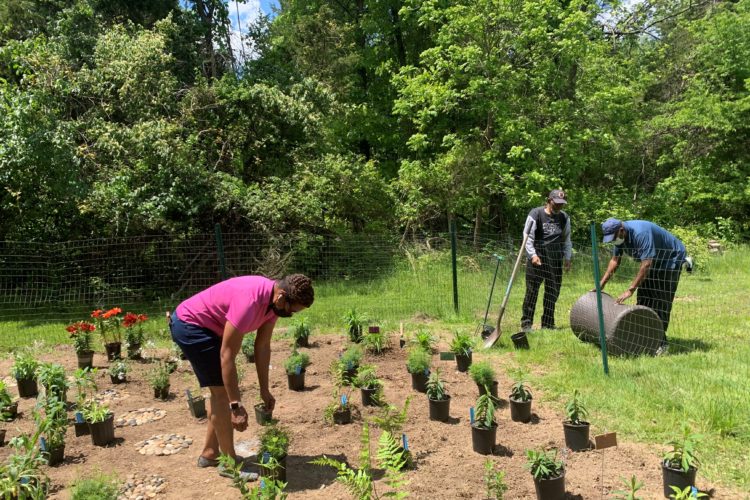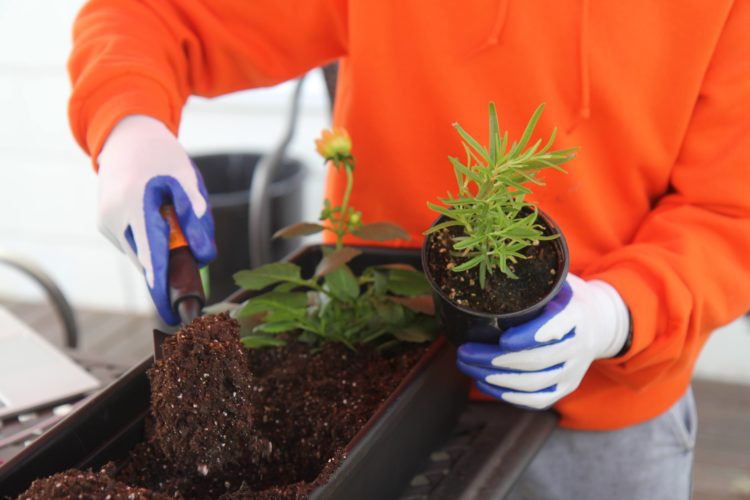We have much more to do and your continued support is needed now more than ever.
WildSTEM Partnership Elevates Equity and Inclusion in the Environmental Field

The National Wildlife Federation and The Links, Incorporated (The Links) are celebrating another year of a groundbreaking partnership focused on promoting youth engagement around gardening, wildlife conservation, and career preparation for Black students across the U.S. and Caribbean. This “WildSTEM” partnership builds upon work the two organizations began in 2018. The WildSTEM initiative provides opportunities for young children to college students to learn about the environment and become active agents for positive change in their communities.
Both organizations are committed to the values and principles of environmental justice. This partnership is unique in that The Links’ diverse network of 16,000 professional women of color located in 292 chapters spanning 41 states, the District of Columbia, the Commonwealth of the Bahamas, and the United Kingdom allows the National Wildlife Federation to work directly with valuable community leaders to create quality habitat in their respective communities. The WildSTEM partnership is focused on advancing equity and diversity in the environmental field by investing in Black youth.
The WildSTEM initiative is committed to connecting all people to nature while inspiring a new generation of environmental stewards.

In addition to its national partnership with the National Wildlife Federation, The Links has a national partnership with the National Society of Black Engineers (NSBE).
Under this partnership, Links Chapters have established 144 Links-NSBE Jr. chapters to date to create high-quality STEM education programs for underrepresented minority students between grades 3 and 12. These chapters are located across the country, as well as in Jamaica, Ghana, South Africa, and Haiti. Over the past two years, several Links chapters have worked with K-12 students, including those in their Links-NSBE Jr. Chapters, and college students from Historically Black Colleges and Universities (HBCU) to plant certified wildlife habitats across the U.S. and the Caribbean at homes, schools, community centers, and churches.
WildSTEM Virtual Education
For example, this year through their High eSTEAM program, the Reston (VA) Chapter of The Links hosted two virtual workshops about pollinators, wildlife conservation and had various environmental professionals, including a NASA scientist, as guest speakers. In addition to these successful youth gardening workshops, the Reston chapter planted a pollinator garden at the Mt. Pleasant Baptist Church located in northern Virginia. Watch this video documenting the planting of the garden and the dedicated, enthusiastic volunteers who made it possible.
Several other Links Chapters delivered outstanding WildSTEM education virtually this spring notwithstanding the Covid-19 pandemic. The Jackson County (MO) Chapter distributed at-home gardening kits to each of their Links-NSBE Jr. students and hosted two virtual gardening “how-to” sessions for their students and volunteers. They also doubled the size of their Certified Wildlife Habitat garden at the Blue Hill Neighborhood in Kansas City.
Similarly, the Potomac (VA) and the James River Valley (VA) Chapters held virtual gardening WildSTEM workshops with their Links-NSBE Jr. Chapter students. James River Valley completed an at-home pollinator seed activity with their students. This month they will continue their WildSTEM educational programming with their Links-NSBE Jr. students at the Mt. Zion Primary and Infant School in Jamaica.

The Prince George’s County, (MD) Chapter of The Links has formed a new partnership with the Patuxent Research Refuge, the nation’s only national wildlife refuge established to support wildlife research. They are working together to plant a wildlife garden in the community. This chapter also worked with their Links-NSBE Jr. students to lead an at-home container garden project with a local senior center.
The Harbor City (MD) Chapter of The Links hosted a ‘Garden for Wildlife’ workshop for their Harbor City Links Scholars. The Harbor City Links Scholars program provides financial support, mentorship, and enrichment activities to soon-to-be college graduates from Coppin State University. During this workshop, the Harbor City Links provided students with an at-home planting kit and a live virtual planting demonstration.
The chapter also partnered with the National Aquarium, Living Classrooms, Maryland Port Administration, Maryland Environmental Service, and the Chesapeake Conservancy on this WildSTEM workshop to expose these students to careers and internships in the environmental sector and to create awareness of environmental justice and the impact of environmental issues on communities of color.
“The Eastern Area of The Links, Incorporated, is very excited that several chapters in our area are actively participating in the National Wildlife Federation’s Wild Stem Gardens for Life initiative. Chapters in Virginia, Maryland, New York, and other chapters in the Eastern Area are growing community gardens (such as the certified gardens grown by the Reston, VA chapter). We recognize the importance of embracing nature while educating our communities about the importance of sustaining life. We are looking forward to continuing this outstanding partnership” says Cheri L. Amado, Eastern Area Links, STEM Initiative Co-chair.
The National Wildlife Federation has created specialized educational resources for all Link chapters that participate in the WildSTEM initiative. The Links chapters now have a virtual learning monthly planning guide with activities and resources about environmental justice, wildlife and pollinator conservation, and designing wildlife habitats and pollinator gardens. This guide integrates STEM education and environmental justice, which will support high-quality educational outcomes for a diverse generation of Black conservationists and environmentalists.
Additionally, all members of The Links and Links chapters have access to a new pollinator garden ‘how-to’ brochure. This brochure is tailored to support The Links’ chapters and volunteers who want to create wildlife habitats where they live, work, learn, play, and worship.
Change starts with passionate, informed, and engaged young people
In the wake of the COVID-19 pandemic, more individuals and organizations than ever grappled with environmental racism and its impacts on Black and brown communities in the U.S. and abroad. Addressing the unjust history of the environmental movement and collaboratively crafting solutions with frontline communities is important. Equally important is the investment in marginalized and frontline communities through wildlife gardening and habitat creation, which is a core facet of the WildSTEM partnership.

Dr. Kimberly Jeffries Leonard, National President of The Links, Incorporated, stated, “by being champions of justice and equity in the conservation space, we can heal others, and heal our communities. These challenges require equitable and just solutions, and we must ensure that children and adults are given the tools needed to find solutions for their communities.”
Toward this end, The Links, Incorporated partnered with the National Wildlife Federation to sponsor and support the success of the multi-year Creating Safe Spaces Initiative. The Safe Spaces Initiative focuses on engaging experts, policymakers, and activists to elevate issues, concerns, and potential solutions tailored to address the unique challenges and barriers that varying identity groups face when accessing and enjoying the outdoors.
The National Wildlife Federation is proud to work with The Links, Incorporated on a partnership that values authentic relationships, community engagement, and environmental justice. For more resources on how to create wildlife habitats at home or in your community check out Garden for Wildlife. Check out the Community Wildlife Habitat, Mayors’ Monarch Pledge, and Sacred Grounds programs for ways to get involved in community-driven conservation. Work with your local schools through Eco-Schools USA and Schoolyard Habitats programs.





















